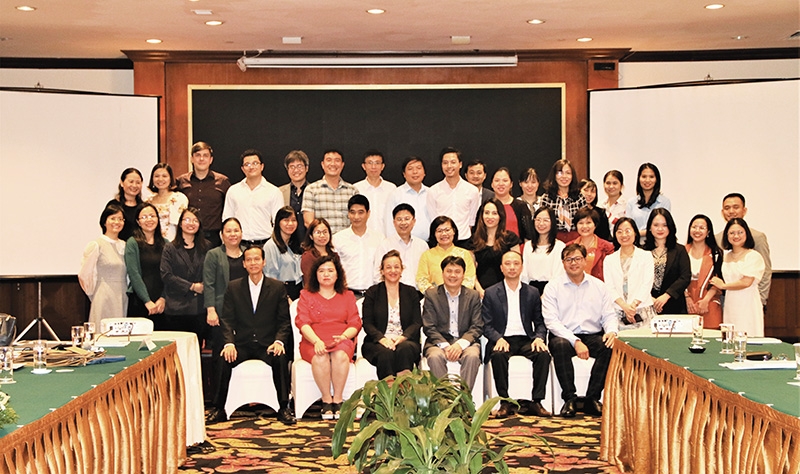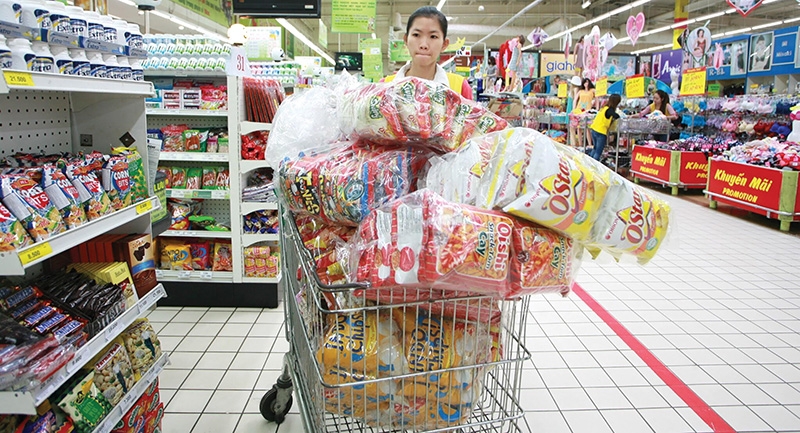Supermarkets hammer out details on future of plastics
 |
| Last week’s consultation workshop opened discussions on the goals of the Plastic Alliance |
The Plastic Alliance is one of four initiatives under the Rethinking Plastics – Circular Economy Solutions to Marine Litter Project running in Vietnam until 2022, co-funded by the European Union and the German government.
The launch took place in the framework of a consultation workshop with representatives from some of the country’s largest supermarket chains and local authorities gathered to open discussions on an MoU to establish the Plastic Alliance, following the example of a similar and successful initiative in Thailand.
According to the Institute of Strategy and Policy on Natural Resources and Environment (ISPONRE), which is implementing the pilot project, and Expertise France – the implementation unit for the entire Rethinking Plastics Project in Vietnam – the MoU would outline a voluntary commitment for action against single-use plastic bags by supermarkets operating in Vietnam, gathering supermarkets and retailers into a unified front.
Kim Thi Thuy Ngoc, head of the Division of Science and International Cooperation at ISPONRE, outlined tentative targets for the 1-year Plastic Alliance pilot programme. The goals could, she offered as an example, include replacing single-use plastic bags with eco-friendly bags at participating supermarkets in Hanoi and communication and consumer awareness raising activities.
“This and ancillary initiatives could target a 10 per cent reduction in the total amount of single-use plastic bags compared to 2020,” she suggested.
At the same time, ISPONRE proposed that all supermarkets participating in the alliance could roll out communication activities to raise consumer awareness and run promotion and discount programmes that could include providing discounts and bonus points for plastic-free purchases.
Fanny Quertamp, senior advisor in Vietnam at Expertise France, shared some experiences from France, Germany, and Thailand to highlight that besides the objectives, engaging supermarkets that share a common goal would be an initial step.
“We are aware that the initial terms of the MoU are loose. This is to allow wide participation to open the doors for subsequent, higher commitments. At the same time, they will remain open to revisions and change,” Quertamp said.
She explained that while supermarkets have their own plastic reduction initiatives, these efforts are disparate and unsustainable. Creating an alliance would bring industry stakeholders together, standardising sustainability action and crafting market-wide promotion schemes. One major objective consists of the formulation of recommendations for public policies at the national level. Additionally, the Plastic Alliance would help develop and implement a communications programme to mobilise participation and encourage sustainable consumption.
 |
Supermarket stance – more or less?
The consultation workshop gave way to a spirited discussion by representatives of the leading supermarkets across Vietnam, discussing the form of the Plastic Alliance.
While there was widespread agreement about the necessity of an alliance and reducing plastics, participants were divided over where the initiative should start from, with many calling for more detailed government regulations to provide a framework for individual and collective plastic reduction efforts.
Nguyen Nhon Quy, corporate communication and social responsibility manager at AEON Vietnam, highlighted that initiatives like charging for plastic bags could reduce customer satisfaction. He cited an AEON survey showing that 65 per cent of customers were not happy to pay extra for greener bags. He advised that the regulatory environment should be made to encourage anti-plastic moves and customer perceptions changed before serious action could be taken.
Meanwhile, some of the participants suggested expanding the scope of the alliance outside Hanoi to turn it into a nationwide platform, precluding the formation of other groupings in other cities. This would help supermarkets follow uniform standards in all geographies and present a unified front in regulatory lobbying.
Nguyen Trung Thang, deputy director general of ISPONRE, said that while Vietnam has set the target to switch completely to eco-friendly plastic bags in all retail units by 2025, implementation is lacking and industry-wide support would be essential to promote awareness.
Quertamp argued that the environmental situation has progressed beyond the point where supermarkets and industries can afford to wait on the government to take initiative. She stated that all stakeholders need to come together to take action, proactively crafting recommendations to shape the legal framework through discourse and reining in plastics through action.
The stakeholders ended the meeting with an agreement to continue discussing the details of the MoU.
Rethinking Plastics Project
The pilot project is part of the Rethinking Plastics – Circular Economy Solutions to Marine Litter Project commissioned by the EU and the German Federal Ministry for Economic Cooperation and Development. This larger project is being implemented by Expertise France and GIZ across Vietnam, China, Indonesia, the Philippines, Thailand, Singapore, and Japan from May 2019 until April 2022. The main beneficiary of the pilot project is Ministry of Industry and Trade.
In Vietnam, the Rethinking Plastics Project is implemented by Expertise France in partnership with the Ministry of Natural Resources and Environment.
The project aims to support the transition towards the sustainable consumption and production of plastic in East and Southeast Asia to contribute to a significant reduction of marine litter in line with the EU Plastics Strategy.
Bringing experiences from across the EU to the region in reducing single-use plastics in supermarkets, the Rethinking Plastics project includes a series of national and international campaigns that promote positive change at all levels of the plastic chain.
Much like in China, Indonesia, the Philippines, and Thailand, the scheme focuses on promoting transition to a circular economy via plastic waste prevention and management in Vietnam. Current priorities include initiatives to reduce single-use plastics in food delivery and takeaway, which saw a rise due to pandemic-related restaurant closures. Additionally, it aims to provide support for waste management in ports and consultancy regarding extended producer responsibility for packaging.
What the stars mean:
★ Poor ★ ★ Promising ★★★ Good ★★★★ Very good ★★★★★ Exceptional
Themes: Climate Change Response
Related Contents
Latest News
More News
- Keppel Land raise plastic waste awareness (July 09, 2022 | 13:45)
- 3Vs for gender-inclusive circular era (July 01, 2022 | 14:33)
- Alliances formed in mission to alter behaviours (July 01, 2022 | 14:19)
- Plastic use drop hinges on consumers (July 01, 2022 | 14:03)
- Mainstreaming circular plastic plans (July 01, 2022 | 13:18)
- Applying popular new methods to combat single-use plastic habit (July 01, 2022 | 10:00)
- Retailers endeavor to promote sustainable consumption patterns (June 24, 2022 | 14:46)
- BAEMIN extends green journey in Vietnam (June 23, 2022 | 14:51)
- Closing event of Rethinking Plastics heralds new age of combatting plastic pollution (June 23, 2022 | 11:53)
- Talkshow Innovative Solutions & Substitutes for Single-use Plastic towards Green Consumption (June 22, 2022 | 20:46)

 Tag:
Tag:




















 Mobile Version
Mobile Version